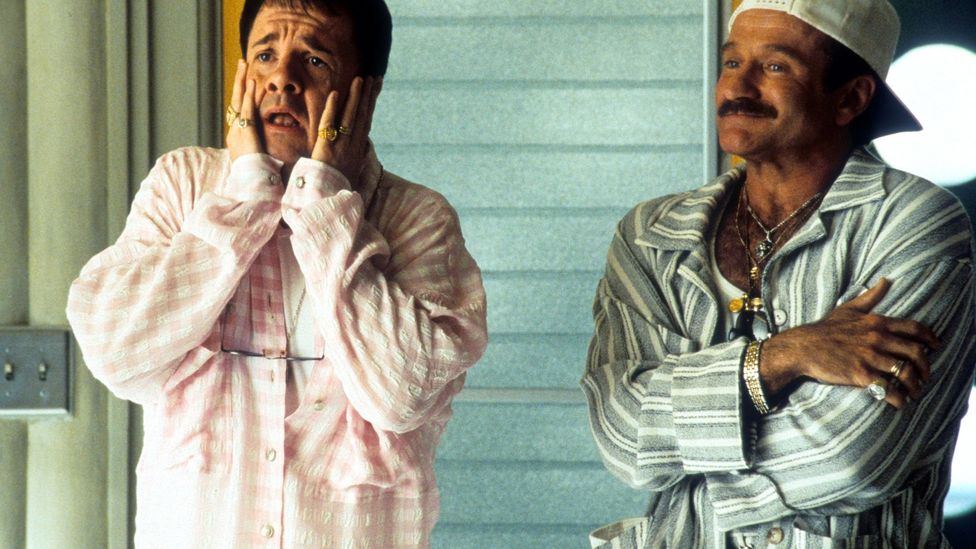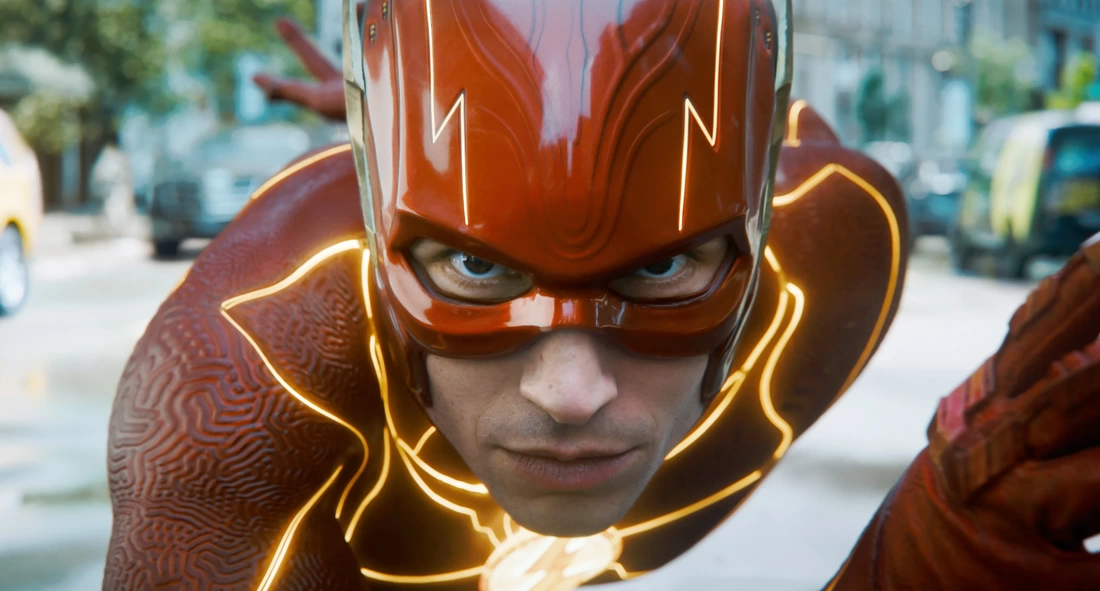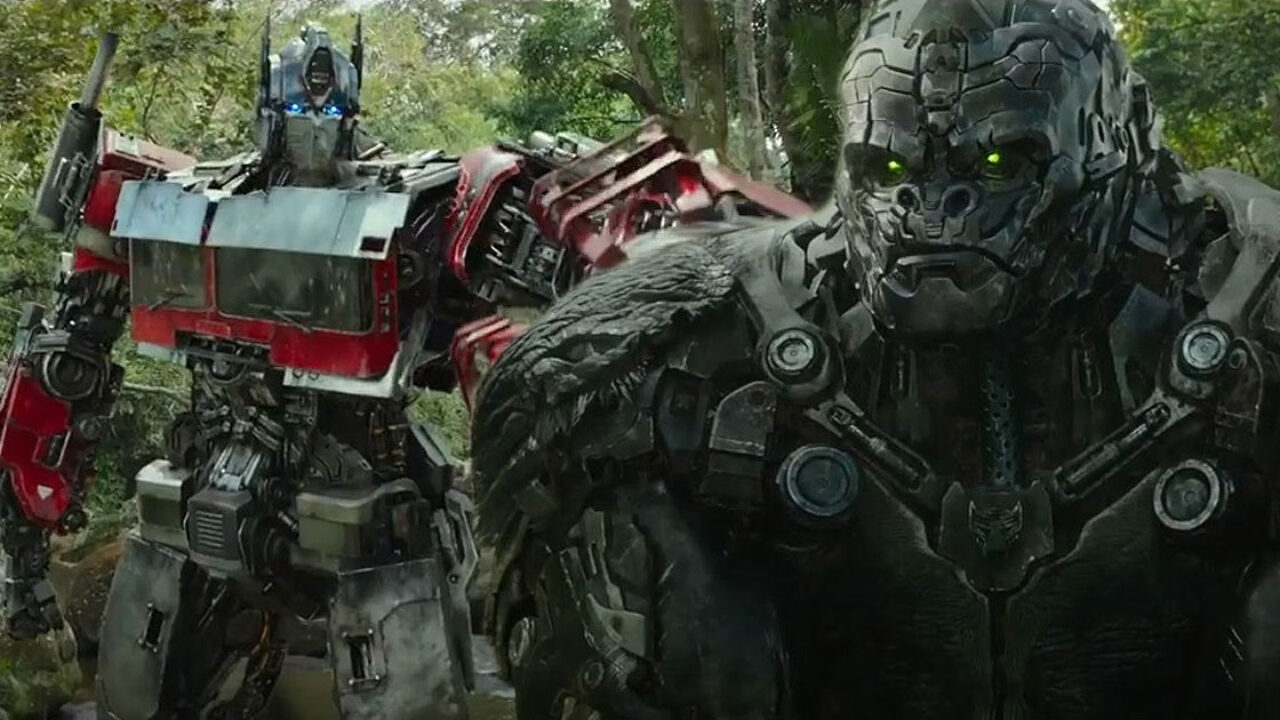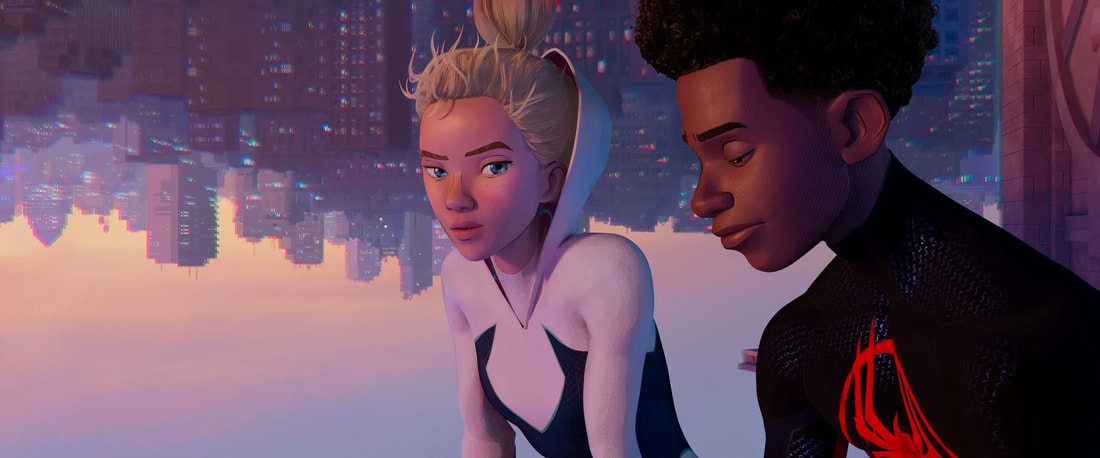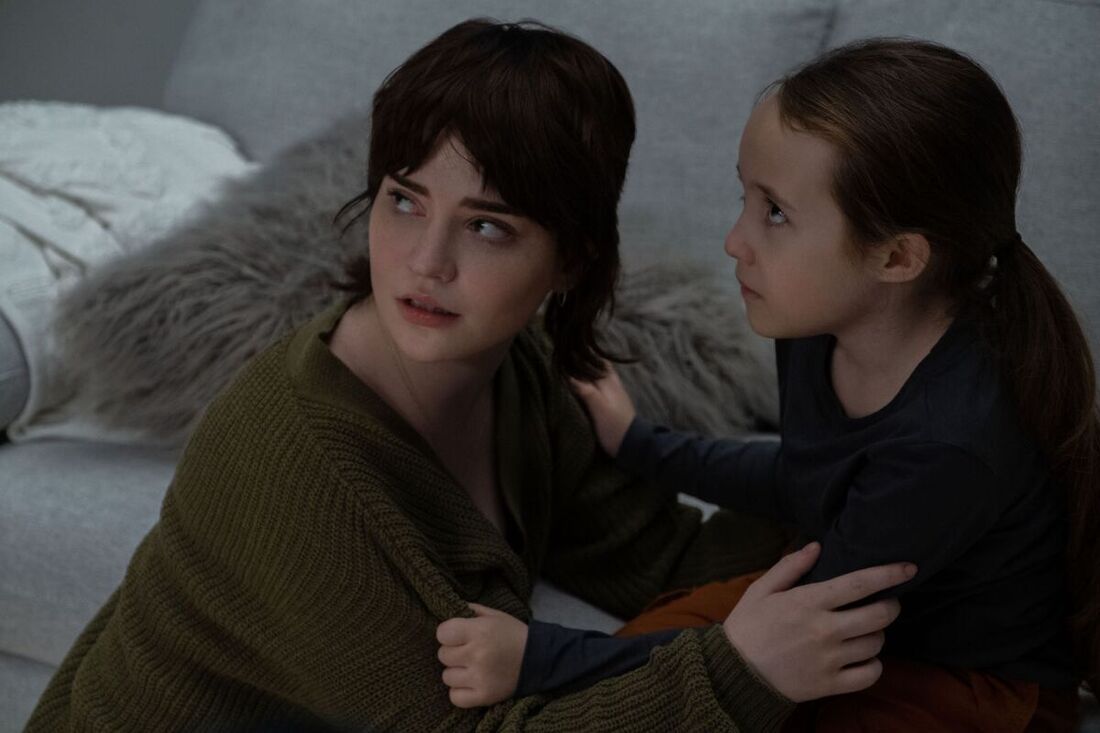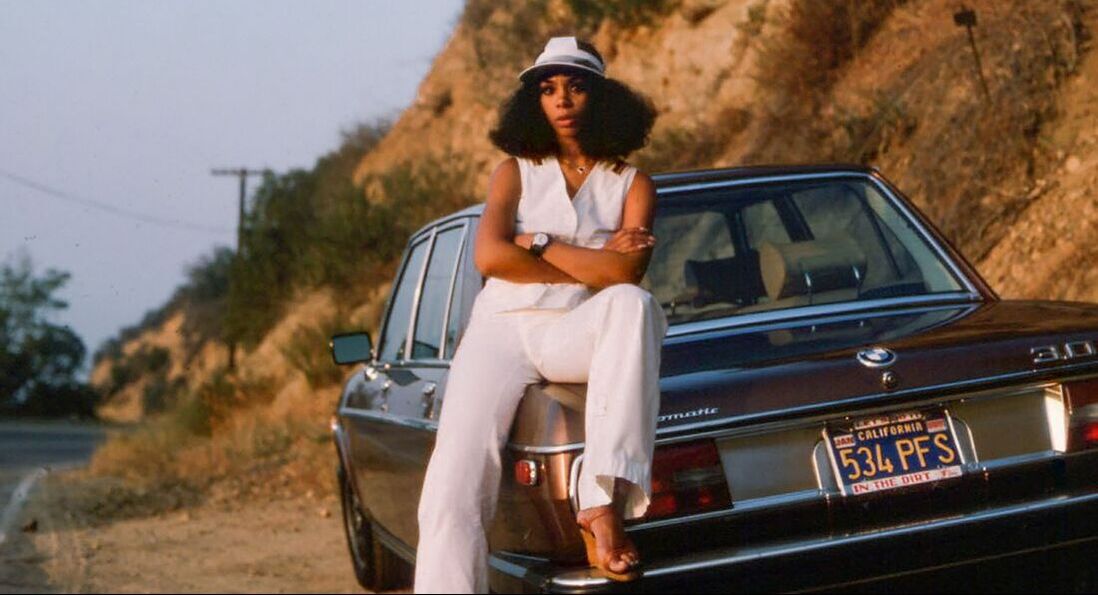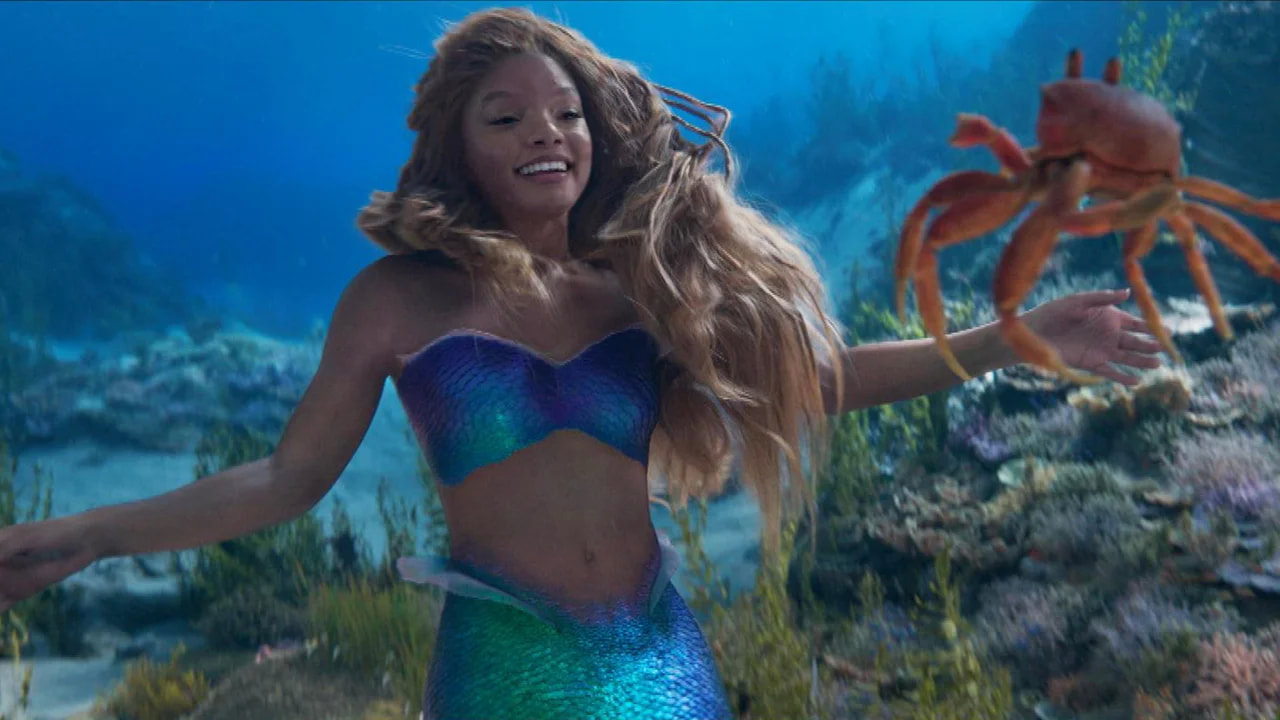|
by Julian Spivey In December I saw something called the “12 Movies Challenge” on Facebook. The premise was that you would have 12 months to watch 12 movies recommended by 12 friends. I don’t often participate in such social media challenges but being a movie buff I felt this might be an interesting way to get out of my comfort zone a bit when it comes to watching movies. My Facebook buds gave me some films that I’ve been meaning to watch and I pretty much front-loaded those on the list – though not explicitly stated in the challenge rules I am opting to watch one film a month. A Best Picture winner like “Out of Africa” is an obvious choice for me to get to at some point – that point is now going to be March of this year. But there are certain movies I’m not really looking forward to all that much – I’m looking at you “The Ghost and Mr. Chicken,” my August selection. Then there’s the acclaimed stuff that isn’t really up my alley like the anime feature “Spirited Away,” which I’ve scheduled for November. That will truly be me getting out of my comfort zone. Here are the 12 movies recommended to me and the months I’ve assigned myself to watch them: January: “Merry Christmas, Mr. Lawrence” (1983) February: “Till” (2022) March: “Out of Africa” (1985) April: “Legally Blonde” (2001) May: “The Devil Wears Prada” (2006) June: “The Birdcage” (1996) July: “Morning Glory” (2010) August: “The Ghost and Mr. Chicken” (1966) September: “Pan’s Labyrinth” (2006) October: “Rocky Horror Picture Show” (1975) November: “Spirited Away” (2001) December: “The Last Laugh” (1924) Back on track! After finally watching a recommendation that I didn’t care much for in May – director David Frankel’s “The Devil Wears Prada,” starring Meryl Streep and Anne Hathaway – it was nice to get back to a movie that I enjoyed for my June recommendation, which was “The Birdcage” as recommended by my friend Remington. “The Birdcage,” director Mike Nichols’ 1996 comedy about a gay couple – nightclub owner Armand (Robin Williams) and his partner and star of his drag show Albert (Nathan Lane) who must act straight to appease the conservative parents (Gene Hackman, Dianne Wiest) of their son’s fiancée, was one of my most anticipated recommendations when I asked for them back in December because it’s one that’s been on my “to watch” list for many years and I hadn’t gotten around to watching yet. Now I had no excuse not to do so. I also felt this would be a great pick for Pride Month. Thanks, Remi! Have you ever watched a movie that’s really good but you’re somewhat underwhelmed by it? Right or wrong that’s kind of how I felt after watching “The Birdcage.” It’s a really good movie. I enjoyed it. The performances – especially those of Williams and Lane – are really good and the script, adapted by Nichols’ early comedy partner Elaine May from a 1978 French film “La Cage aux Folles” was both humorous and touching. The movie was so good my IMDb user score for it is an 8/10. The average user score comes out to 7.2 – so you can say I liked it more than most. My problem comes from having high expectations – an issue I come across with many older, critically-acclaimed, potentially all-time great films. Mike Nichols. Elaine May. Robin Williams. Gene Hackman. Nathan Lane. Dianne Wiest. You see these names involved in a project and you think, “This might be the best thing I’ve seen in a long time.” So, when it just turns out to be a really good, lovely film and not something I’m instantly going to place in my all-time 100 favorite films it can seem underwhelming. That’s my problem. Those people involved did their job supremely. I had some thoughts and questions while watching “The Birdcage” I’d like to mention.
And here’s the biggest problem I had with the movie – though I acknowledge if it played out the way I wish it would’ve played out you wouldn’t actually have this particular movie. Val (Dan Futterman), Armand’s son, clearly loves his parents but he’s also afraid of them affecting his relationship with Barbara (Calista Flockhart). So, he’s also embarrassed by them – which is hard to watch. The fact that he would make Armand act straight, change his lifestyle and the entire culture of his house and especially trying to kick Albert out of the house for the visit of the future in-laws is incredibly offensive to them – and Armand lets him know it, but Armand loves his son so much he’s willing to do it all for him. This wouldn’t fly in my house. If I were Armand I’d tell Val to go to hell. I’m not changing who I am to appease people who don’t understand me, people who view me as something lesser. It sets up the entire plot of the film, but it’s also so offensive and such a despicable thing that Val does to his parents that it really makes you hate the character a bit. OK, so looking at my list of recommendations for the second half of 2023 I can see that I clearly front-loaded the year with movies I was more interested in seeing – maybe because I was more interested in them or maybe because I thought I might give up on this exercise before the year’s end. I’m determined to make it through! Next up is … “Morning Glory,” a 2010 rom-com starring Rachel McAdams, Harrison Ford and Diane Keaton, which has a Rotten Tomato score of 55 percent and an even worse Audience Score of 51 percent (which is a rare thing from what I’ve seen). Oh boy!
0 Comments
by Philip Price Director: Andy Muschietti Starring: Ezra Miller, Michael Keaton & Sasha Calle Rated: PG-13 Runtime: 2 hours & 24 minutes The dominance of the comic book movie over the last twenty-something-odd years has admittedly brought me plenty of joy and moments of pure cinematic euphoria, but as we reach what is at least our sixth multiverse film in the last five years (and the second in the last three weeks) I think I've reached the acceptance phase of letting go. Letting go not necessarily because I want to, but because it has become more and more apparent that it is time. While it would feel easy to be angry, depressed, or even regretful about the direction of the genre and what superhero films have collectively become over the past few years it would seem simpler (and easier) to just accept that “The Flash” is a prime example of why these types of films have begun to feel like they're eating themselves and thus, as much as I hate to say it, why it's time to take a break. Letting go, not just of the possibilities that have both been fulfilled and lost, but of the individuals who pioneered these characters as flesh and blood. Listen, I get it, letting go is hard because it means freeing one's self from aspects of their past, things that have become such a big part of a person's life they may even define part of their personality and it's understandable why, rather than moving forward, one might want to remain in this state of familiarity - there's a comfortability in it - but director Andy Muschietti's “The Flash” is a watershed moment in the superhero genre not because it breaks new ground or re-energizes the kind of escapism these movies can provide, but because it brought upon the realization there is a difference in being comfortable and being resistant and that one can only resist change for so long before what was once a source of comfort becomes discomfort as the seeds of doubt and truth that what once was no longer is begin to grow and further, that a person can only tolerate discomfort for so long before admitting that change is necessary. This may all feel a little obvious to some and minor to others and I understand how it might even seem downright dramatic to those regularly unengaged with the discourse around the genre or film in general, but aside from some standard complaints to be made about the film (it's more ugly than awe-inducing, it's a narrative mess that likely won't hold up under scrutiny, and aside from the titular character there is little empathy or investment to be made toward anything or anyone) the fact that as I was sitting there, trying to be excited about what I was watching and instead began to contemplate where the edge of the cliff was and how much Michael Keaton's version of Bruce Wayne/Batman didn't deserve or need this I couldn't help but to then wonder why my brain was going down that route. The truth is, and context is important, that despite all the hype James Gunn and everyone who saw the movie several months ago heaped on the film that's not why I was excited to see “The Flash.” I was excited to see “The Flash” because I thought Ezra Miller was an inspired choice, I enjoyed his contributions in “Justice League” and also because I enjoyed the CW show for some time before it too ran itself off a cliff. The point being, the idea of this character getting a solo feature and seeing the best of what that recent series had to offer told on a bigger scale with a more finite structure sounded really appealing and an opportunity for someone with genuine vision to do something interesting. While I might have preferred Rick Famuyiwa's (“Dope”) or John Francis Daley and Jonathan Goldstein's (“Game Night”) takes on the character more I was enough of a fan of Muschietti's ‘IT’ films to feel confident he could deliver. And I don't want to take away from what he does accomplish here as there are moments among this multiversal mess that felt inspired and a novel take on the given premise, but when the finale of your film is set in the middle of nowhere (and worse, is visually dull because of it) not because the story dictates as much, but because it's more a direct response to the backlash “Man of Steel” received then we're making movies based on how they might be judged rather than what our gut tells us they should be and that's neither art nor entertainment – it’s just pandering. Where “The Flash” goes in its final minutes may be the most desperate and unnecessary attempt at catering to a fanbase making the taste it leaves with its audience even more offensive. Admittedly, the genre itself is very much a double-edged sword depending on a given project's ambition and narrative priorities and while “Across the Spider-Verse” mixed innovative visual stylings and allowed its themes to lead its plot while melding the two to create a singular tone “The Flash” feels the opposite in every category. It's a basic truth in life that you take the bad with the good, but that doesn't have to be true at the movies. Maybe we don't have to let go of the whole genre to move on or move forward, but we definitely need to be more selective on what we let into our lives. by Philip Price Director: Steven Caple Jr. Starring: Peter Cullen, Anthony Ramos & Dominique Fishback Rated: PG-13 (intense sci-fi action and violence, language) Runtime: 2 hours & 7 minutes Sixteen years removed from director Michael Bay’s original foray into live-action robots in disguise and if one were to only watch that initial film and the latest from director Steven Caple Jr. (“Creed II”) they would be accurate in feeling like we haven’t come nearly as far as the journey has felt. There would be more to it than meets the eye if you will. As the interim between these two films has offered four sequels and a spin-off though, “Transformers: Rise of the Beasts” doesn’t feel so much redundant as it does refreshing; the franchise growing from the humble reset that was “Bumblebee” while never allowing itself the arrogance of believing it takes anything near two hours and 45 minutes (yes, that’s the actual runtime of 2014’s ‘Age of Extinction’) to tell what a three episode arc in the cartoon would easily be. ‘Rise of the Beasts’ is, for all intents and purposes, another ‘Transformers’ film where the thing a bad guy needs to complete/destroy/take over has somehow made its way to earth and the stranded autobots must help a couple of humans who’ve become tangled in the intergalactic mess defeat the antagonist and save the world. The film adheres to these familiar archetypes while executing them in clear and endearing ways. This is especially true when it comes to the action sequences as well as the human characters. Both Anthony Ramos and Dominique Fishback are so appealing with Ramos lending his effortlessly cool aura to the tone of the film while Fishback infuses things with a certain amount of gravity that feels more authentic than put upon. The New York-based ‘90s setting doesn’t hurt either as Caple and his set designers go all in on the pop culture references, specific car models, and of course - the soundtrack. Wu-Tang, Tribe Called Quest, Biggie and LL Cool J tracks all drop at opportune times, enhancing the procedural nature of the plot points and invigorating the vibe again and again. While the human characters genuinely work in more involving ways than they have since probably that original ‘07 film, this is still a ‘Transformers’ movie, and the robots are still the stars. The big change-up/draw of this latest film being that they have brought in the “Maximals” who have a lot of history as I’ve learned but can best be summed up as robot animals and descendants of the Autobots. That said, this new line of toys - I mean characters - while theoretically the marquee attraction of this latest installment are the crux of the plot they are not brought into the fold until the second hour of the film which is just enough time to not develop them into actual characters. Instead, Optimus Prime (once again voiced by Peter Cullen) is actually given an arc this time beginning as a responsibility-bearing leader who doesn't trust humans and blames himself for things beyond his control ultimately making his objectives more narrow than non-discriminatory and growing into a more balanced, dare I say more mature leader that learns the value in listening rather than assuming his courage and confidence will solve everything. This theme of developing the autobots as more than plot devices doesn’t stop with Optimus though as Pete Davidson gives maybe his (best?) most nuanced film performance since his debut as a wise-cracking robot named Mirage that, given the film’s ‘90s time stamp, appropriately develops an ‘Iron Giant’-like dynamic with Ramos’ Noah. Davidson also squeezes in a pretty solid Marky Mark and the Funky Bunch joke, so everyone wins. There isn’t enough real estate to devote the same development to Arcee (voice of Liza Koshy) and Bumblebee, but each get equally cool moments thanks to a few of those aforementioned needle drops. The tension throughout the whole of the movie is somewhat moot due to the fact we know the autobots survive (a given), but to Caple and his team’s credit we really feel the threat of the planet eating machine Unicron (get that money, Colman Domingo) and his cronies led by Scurge (voice of Peter Dinklage) whose menacing determination and how this is presented give the impression they might at least give Optimus and the gang a run for their money. Caple also infuses the film with an energetic pacing that doesn't focus too much on the silly plot and instead uses the standard archetypes and structure it's relying on to produce a fun adventure flick reminiscent of the type of films more prominent during the time in which this film is set. And while I'm not sure why Shia Labeouf was never gifted the opportunity to be an Iron Man or where the implication of the final scene might lead I do know that Peru was a really inspired location choice, that it was utilized well, and if Paramount and Hasbro can continue to rely on filmmakers who keep the tone in check and the fun intact I would happily watch another six of these movies over the next decade and a half. by Philip Price Directors: Joaquim Dos Santos, Kemp Powers & Justin K. Thompson Starring: Shameik Moore, Hailee Steinfeld & Brian Tyree Henry Rated: PG (animated action violence, some language and thematic elements) Runtime: 2 hours & 20 minutes What makes a spider-person the hero they are? Or the person they are? Just as Miles Morales feels like an anomaly among his own, this film is very much that in both today’s comic book movie and cinematic landscape. Utilizing every element at its disposal to convey character feelings and better distinguish each of the many universes it creates, every aspect feels organic despite being completely constructed out of oblivion. Themes resonate more than the sometimes confusing plot, but the care and love evident in every decision makes all the multiverse talk more semantics than linchpins. It’s something special even if it’s not completely clear what it is; though, instead of considering it the anomaly it is we might simply recognize (appropriately) that it goes beyond anything we’ve seen before. As breathtakingly beautiful and boundary-pushing as it is visually it also attempts some rather daring narrative choices by upending the peace Morales (voice of Shameik Moore) found in becoming Spidey at the conclusion of the previous film and more specifically, the peace in being part of a tribe that finally understood him. Speaking of conclusions and daring narrative choices, this is definitively part one of a two-part story and thus there isn't a resounding completeness to all of the themes and arcs that “Across the Spider-Verse” puts forward (and it's a lot). Knowing this is set-up for a third film due next year the cliffhanger of an ending didn't bother me but feels worth mentioning due to the multiple groans heard in my screening when that "To Be Continued..." hit. It was the only part of the experience that evoked the current state of comic book movies. The contrast in the strength of the storytelling and emotional resonance of the themes in spite of the inherent "comic-bookness" of the plot (which is to say, this is a movie that has its cake and eats it too in terms of appealing to both avid and casual fans) is maybe the most impressive thing this sequel accomplishes which is saying a lot for a movie that looks as dazzlingly distinct as this and features just an all-timer of a soundtrack from METRO BOOMIN. While the meta-commentary approach is nothing new for writer/producers Phil Lord and Chris Miller (‘Jump Street’ movies), “Across the Spider-Verse” is notable for how it both fully delivers on what comic book fans or should I say, "fans of the canon," want from a Spider-Man multiverse movie while simultaneously holding up a mirror to the oftentimes toxic mentality prevalent in such circles where outrage is frequently the first reaction when a beloved character is treated differently. As Spider-Gwen states herself when commenting on some Jeff Koons balloon animals, "It’s more a meta-commentary on what we call art, but it’s still art.” Yes, there are certain events key to the Peter Parker mythos that make him both the person and the hero he becomes, but this is Miles' story and - as Oscar Isaac's Miguel O'Hara tells us - Miles was never meant to be Spider-Man. As that is what came to pass though, Miles can't help but to inherently lean toward breaking the chains of said "canon" (and maybe the fabric of the multiverse) in order to write his own story. Directors Joaquim Dos Santos, Kemp Powers and Justin K. Thompson bake in the idea of not only how this is different from past ‘Spider-Man’ films, but why it's necessary to divert from said "canon" in order to create something new and different that still carries the soul of what made fans fall in love with Spidey in the first place: figuring out the balance of being a hero to everyone and being everything to those closest to him. That basic DNA still resides in Miles Morales, but where some see holes in his story he sees the answer to his own future as the web-slinging hero; likely not the only connection he has with new supervillain Spot (voice of Jason Schwartzman). Coupling this level of commentary with these themes of the events we let define our lives, the way parents tend to mess up their children even when hoping to help them, as well as the sheer level of execution at work here “Across the Spider-Verse” is indeed a work of art, an achievement, and not simply another movie but an experience that doesn't have to do much convincing to have you run the gamut of emotions it is prepared to take you on. by Philip Price Director: Rob Savage Starring: Sophie Thatcher, Chris Messina & Vivien Lyra Blair Rated: PG-13 (terror, violent content, teen drug use & some strong language) Runtime: 1 hour & 38 minutes Movie teenagers are the worst, but the teens in attendance at my screening of “The Boogeyman” made the experience all the more enjoyable. Screaming at every minor sound effect, hiding their faces under the covers they brought specifically for that reason and praying they don’t have to overcome a fear of the dark for a second time in their lives after seeing the latest from director Rob Savage. Their reactions honestly may have influenced my enjoyment of the film slightly but only because it became clear how effective the film was at working on its target audience just as it intended. “The Boogeyman” doesn't offer the most original premise, no, but Savage knows how to construct jump scares and build atmosphere; both of which are key to enjoying this well-made and effective horror flick even if the themes and conceit don’t reinvent the wheel. Beginning with the offscreen death of an infant is one way to set a tone (sorry if that's a spoiler) yet Savage goes there and leans into the idea of death without fear of alienating his audience. Rather, the dynamics and situations of his primary cast members are strong out of the gate because Scott Beck, Bryan Woods and Mark Heyman's screenplay takes its time in both describing and processing the grief each character is experiencing and handling in different ways. The Harper family, consisting of a father and his two daughters - one a teen and one on the brink of being a tween - lost their wife and mother to a car accident just over a month ago. Sophie Thatcher's Sadie obviously isn't ready to let go but is having a hard time with even the idea of it. The thought of having to wash her mom's smell out of her clothes breaks her already broken heart and repeatedly looking at the final text messages she'll never get a response to doesn't help either. Meanwhile, her dad (Chris Messina) has completely shut himself off and can't speak about his late wife even when Sadie attempts to reconcile their wounds together. Messina's Will knows better, him being a therapist himself, but he also understands he’s not in a place where he can help heal others of the thing that has broken him. Vivien Lyra Blair plays young Sawyer who seems the least affected outwardly but quickly becomes the most haunted literally as the film's monster in the closet comes for her first; amplifying the fear she'd likely tried to bury in the wake of her mother's absence. Though familiar, these ideas of grief and of coping and how the deeper the roots the harder it is to let go are each set up with such care and guided with such a steady hand that they resonate more than they might were the film interested in nothing more than eliciting the jump scares from those ideas. I haven't read the Stephen King short story on which this is based and therefore can't really speak to how the film resolves itself, but it does somewhat devolve into your standard horror/slasher where the vanquishing of the evil antagonist is questionable at best (it always bothers me when something so cryptic and inexplicable is defeated with something more tactile), but as far as the emotional arcs of the characters are concerned, they were clearly the priority of the filmmakers making the journey a satisfying one even if the monster itself isn't a memorable one. Although, those teens sitting in the row in front of me would absolutely have a few things to say about that. by Philip Price Fast X In a weird turn of events, this is more of a faith-based film than I ever expected while simultaneously mocking both its tropes and the series’ recent solemness by allowing Jason Momoa to literally do whatever the fuck he wants (which is as glorious as you’ve probably heard). In good news, Vin Diesel actually feels like he might finally be in on the joke of these more outlandish latter films in the series as he rides the right wavelength of absurdity when essentially playing a game of pool with his car and an atomic-ass-looking bomb in the middle of Rome. The bad news is the script again wasn’t written by Chris Morgan and again has to find stuff for the massive roster of supporting players to do giving real estate to plot lines (and plot holes) that are unnecessary and derail focus from the elements that really drive the energy of this (a tenth) film … pun intended. I really wish they’d stop undoing things and simply move forward across the finish line with what (and who’s) left so little B is properly set up to lead his own series in seven-to-eight years, but I get it, man – if DC don’t need ya then the ‘Fast’ family will happily welcome you back and if you get a second season of a show then Vin is happy to give you an honorable “death.” Spoilers, I guess. I GUESS. Anywho, the point is: there is a surprising amount of fun to be had with this despite points of complete incoherence. That said, “Fast X” felt like an editing masterclass compared to ‘F9’ as the series now has a destination and therefore a focus that’s been sorely lacking since the departure of Paul Walker’s Brian. Director Louis Leterrier’s penchant for fast-paced, kinetic pacing is also of note as he doesn’t necessarily bring anything new or fresh to the franchise, but his directorial tendencies and tone complement the mentality of these films perfectly. If you see it for anything though, see it for Momoa. The scene where he paints a couple of dead henchman’s toenails is worth the price of admission alone. "Fast X" is currently in theaters. Love to Love You, Donna Summer I don't think I realized how much that "She Works Hard For The Money" music video was deep-rooted in my brain. It was the song on a permanent rotation while my mom did household chores and we danced around the house to MTV's playlist. It's the kind of song memories are set to and the kind of visuals those memories take their cue from.
Everything about this documentary somehow went against the tone of those bright, warm and comforting memories as it revealed Donna Summer, the individual, to be something of a lost soul ... always searching for a purpose that would evade her even when at the top of the world. Co-directed by one of Summer's daughters, Brooklyn Sudano, ‘Love to Love You’ unfortunately only hints at an understanding of what caused this great chasm between performer and individual, of how her image on stage led her to shield even those who were closest with her from her vulnerabilities. This contrast in what Summer represented versus what was going on with her psychologically is certainly interesting terrain to track and cover - especially with her daughters on board to do the work - but this documentary can't help but feel as if it only scratches the surface; outlining only who Donna Summer was with little emphasis despite the primary emphasis on the why. "Love to Love You, Donna Summer" is streaming on Max. by Tyler Glover Director: Rob Marshall Starring: Halle Bailey, Melissa McCarthy & Jonah Hauer-King Rated: PG Runtime: 2 hours & 15 minutes Back in 2010, Disney experienced enormous box office success with their live-action adaptation of “Alice In Wonderland.” This started a quick rush to get all of their animated features a live-action adaptation as soon as possible. Title after title kept getting announced and released. “Maleficent,” “Cinderella,” “The Jungle Book,” “Beauty and the Beast,” “Dumbo,” “Aladdin,” “The Lion King,” “Mulan,” “Cruella,” “Pinocchio,” and “Peter and Wendy” all have come and gone. I have always been a huge fan of all things Disney so I was really excited about all of these announcements. With every one of them though, I was always thinking, “I cannot wait for them to do “The Little Mermaid.” It was the main one I want them to do. This is coming from a boy who watched “The Little Mermaid” over and over again as a child. I sat on big rocks in the woods pretending I had a mermaid tail and singing “Part of Your World.” I had an Ariel Barbie doll. I sang the songs no matter where we were at or going. So needless to say, this is the ULTIMATE Disney live-action adaptation for me! Was it worth it all? The answer is 100 percent YES. For those who don’t know, “The Little Mermaid” follows Ariel (Halle Bailey) who is a teenage mermaid longing to be a part of the human world. She has a romantic interest in Prince Eric (Jonah Hauer-King) but her father, King Triton (Javier Bardem) forbids her from going to the surface. Ariel ends up making a deal with the sea witch, Ursula (Melissa McCarthy) to get legs for three days. However, she has to give up her voice and get a kiss from the Prince within three days in order to remain human. Ariel gets help from her friends: a crab named Sebastian (voiced by Daveed Diggs), a fish named Flounder (voiced by Jacob Tremblay) and a seagull named Scuttle (voiced by Awkwafina). This film is directed by Rob Marshall, who is one of my favorite directors. His past work includes “Chicago,” “Into The Woods” and “Mary Poppins Returns.” These spectacular films prove that Marshall knows what he is doing when it comes to directing movie musicals. “The Little Mermaid” sees Marshall at the top of his game once again. The best thing about “The Little Mermaid” is Bailey’s performance as Ariel. She portrays the curiosity, joy and beauty of the character to perfection. Every time she is on-screen, you are drawn to her. Any person doubting her just needs to watch her sing “Part of Your World” in the film. It was the kind of powerhouse performance you see in a cinema that I felt like I should be giving a standing ovation for. I honestly cannot wait to see what Bailey does next. Another standout performance was McCarthy’s performance as Ursula. She was perfectly cast. It always felt like she was a good fit for the role except for maybe the singing. However, McCarthy gives a spectacular rendition of “Poor Unfortunate Souls.” McCarthy is deliciously evil and even scared my daughters in the movie theater. She definitely delivered a campy and at times, hysterically over-the-top (in all the best ways) performance. The film is so visually appealing. The beautiful fish and the underwater scenes are so well done. My only complaint about the setting was that in some of the underwater scenes, the lighting was very dim. At times, it was difficult to fully see everything. Other than that, the only issue I had with the film was the pacing at the beginning. It seemed to rush through the first few scenes like it just wanted to get the story going before it slows down. Also, the film makes a great decision to make King Triton and Ursula brother and sister. This is an interesting concept but it feels like it is just mentioned as an afterthought when it could have given us some insight into their brother/sister dynamic. These minor issues do not stop “The Little Mermaid” from being the best Disney live-action adaptation to date. Bailey and McCarthy lead an almost near-perfect cast in telling one of the best stories Disney has ever told. |
Archives
July 2024
|
